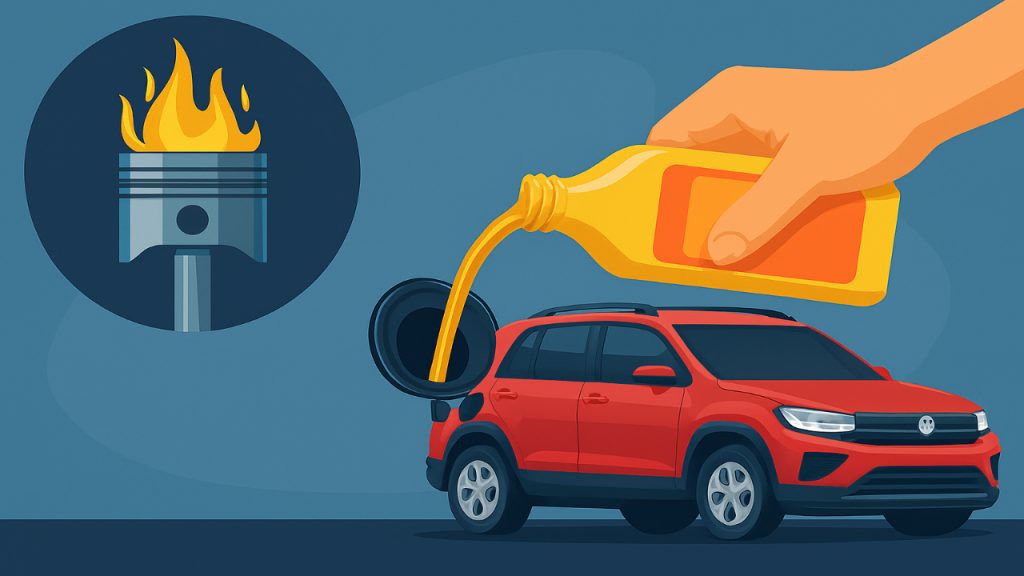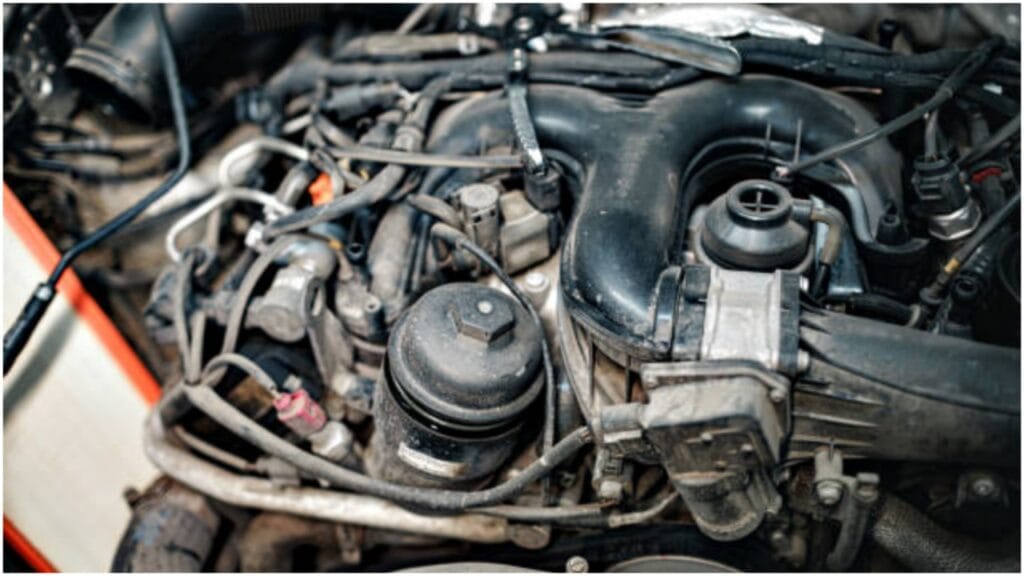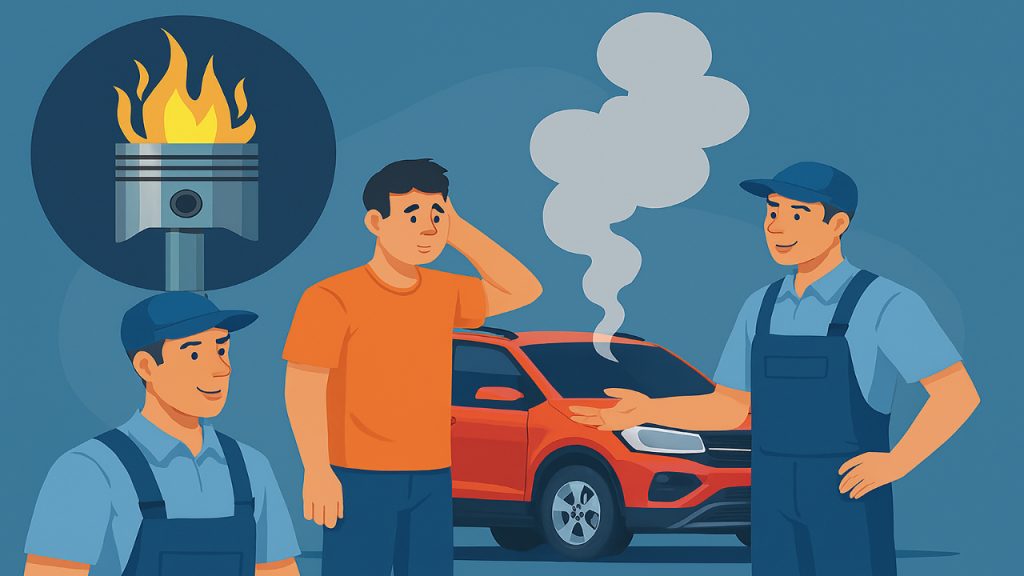That dreaded knocking sound from your engine? It's like a tiny hammer tapping away under the hood, ruining your drive and spiking your stress levels. I've been right where you are - ignoring it at first, then panicking as it got louder.
Trust me, engine knock isn't just annoying; it can chew through pistons, bearings, and your wallet if you let it fester. The good news? You don't need a shop full of fancy tools or a mechanic's paycheck to fix it.
In this guide, I'll share exactly what worked for me after trial and error on my own rides. We're talking engine knock additives that actually deliver, smarter fuel choices, and easy maintenance hacks. No fluff - just battle-tested steps to quiet your engine and keep it running strong. Let's dive in and get your car purring again.
Why Engine Knock Happens

Engine knock, or detonation, happens when fuel-air mixture ignites prematurely or unevenly in the cylinders. It sounds like marbles rattling in a can and feels like vibration through the steering wheel. Common culprits? Low-octane fuel causing pre-ignition, carbon buildup disrupting combustion, worn spark plugs throwing off timing, or even overheating from poor cooling.
Enter engine knock additives: these are fuel system saviors packed with detergents, octane boosters (like MMT or toluene derivatives), and combustion modifiers. They raise effective octane, scrub carbon from injectors, valves, and pistons, and stabilize fuel burn. But here's the reality check I learned firsthand - just pouring in a bottle won't erase years of neglect. It pairs best with consistent use, better habits, and diagnostics.
Pro tip: Before additives, scan for error codes with an OBD-II reader (cheap ones start at $20). Knock could signal bigger issues like bad sensors or rod knock, which additives won't touch.
Step 1: Choose the Right Additive for Your Knock
Not all additives are created equal - I wasted cash on weak ones before nailing the right match. Start by diagnosing your knock: light pinging on acceleration? Likely low octane. Steady rattle at idle? Probably carbon gunk.
- Octane boosters (e.g., Lucas Octane Booster, Royal Purple Max-Boost): Ideal for fuel-related knock. They bump octane 2-5 points, preventing detonation in high-compression or turbo engines.
- Detergent cleaners (e.g., Sea Foam Motor Treatment, Chevron Techron): Attack carbon deposits that cause hot spots. Great for older engines with injector grime.
- All-in-one formulas (e.g., STP Complete Fuel System Cleaner): Boost octane and clean for all-around protection.
Read labels for compatibility - stick to gasoline engines, avoid diesel formulas. I swear by Lucas for my daily driver; one bottle per tank silenced my pinging on 87-octane gas. Test small: Add to a half-tank, drive 100 miles, and listen.
See the best engine additives for knocking.
Step 2: Use Additives Regularly - It's a Habit, Not a One-Off
My biggest mistake? Thinking one dose fixes everything. Nope - carbon builds up over months, so treat it like oil changes: routine wins.
I add a full bottle every 3-5 tanks, especially with bargain gas. Why? It prevents buildup, stabilizes combustion, and extends engine life. In my case, after two weeks of consistent use, idle smoothed out, acceleration sharpened, and MPG climbed 2 points.
Think marathon, not sprint:
- Pour in at fill-up for even mixing.
- Drive normally - highway miles help circulate cleaners.
- Monitor: No change after 300 miles? Switch types or dig deeper.
It's cheaper than repairs (a bottle costs $10-20 vs. $1,000+ for rebuilds) and feels empowering. My truck's been knock-free for 10,000 miles now.
Step 3-Go for Higher - Octane Fuel
I used to think gas was just gas. As long as the tank was full, I was good to go. But then my engine started knocking, and I had no idea why. Turns out, the fuel I was using wasn’t cutting it. Some cars need higher-octane fuel, and if you don’t give it to them, they’ll start complaining -loudly.
I learned this the hard way when I tried saving a few bucks by using regular gas instead of premium. Yeah… a big mistake. My car felt sluggish, and that knocking sound was driving me crazy. Higher - octane fuel burns better and keeps everything running smoother.
It helps prevent knocking, especially in high - performance engines. And yeah, it costs a little more, but trust me, it’s worth it. When I switched back to premium, my car ran like a dream - no knocking, better acceleration, and just overall smoother driving. It felt like my engine was thanking me.
So if your car recommends premium, don’t ignore it. And even if it doesn’t, throwing in a tank of higher-octane fuel now and then can help, especially if you’re dealing with engine knock. Give it a shot - you’ll probably feel the difference right away!
Step 4: Keep Your Engine Clean Inside and Out

Dirty engines knock - fact. Carbon fouls pistons and valves, trapping heat and sparking uneven burns. My wake-up: A neglected intake led to my first major rattle.
Routine cleaning blueprint:
- Fuel additives: Every few tanks, as above.
- Quality gas: Detergent-rich brands like Shell V-Power.
- Oil changes: Every 5,000 km with synthetic; fresh oil fights sludge.
- Intake service: Throttle body cleaner spray every 20,000 km.
I added a top-end cleaner (Berryman B-12) via vacuum line once - game-changer. Engine bay spa day? Feels great, runs better.
Best additives for rod knock and carbon.
Step 5: Inspect and Replace Spark Plugs - Don't Sleep on This
Spark plugs ignite fuel precisely; fouled or wrong-gap ones cause misfires mimicking knock. I ignored mine for 50,000 km - big error.
DIY check (30 mins):
- Tools: Spark plug socket, ratchet, gap tool, dielectric grease.
- Locate plugs (coil-on-plug common now).
- Remove: Note wire order, inspect for black soot/white ash.
- Gap new ones: Match manual (e.g., 0.9-1.1mm).
- Install: Torque to spec (avoid over-tightening), reconnect.
NGK or Bosch iridiums last 100,000 km and resist fouling. Post-swap? My engine idled like new, power surged.
Oil additives for noise reduction.
We’ve Been There - Let’s Fix It Together

That knocking sound? Yeah, we know how frustrating it is. We’ve dealt with it too, and trust me, it’s not something you want to ignore. If you leave it alone, it can turn into serious engine damage. But don’t worry - we’ve learned exactly what works, and we’re here to help you fix it the right way.
So, what’s the deal with engine knock additives? Well, they’re special chemicals that help stop that annoying knock by boosting octane, improving fuel combustion, and cleaning out carbon buildup. The trick is to pick a good one, use it the right way, and stay consistent. Oh, and using better fuel and keeping the engine clean? That helps too.
But here’s the thing - just dumping in an additive won’t magically fix everything. There are a few key things you need to know to get the best results. Keep reading, and we’ll walk you through it all step by step!
Replacing Spark Plugs Step-by-Step
Scared of DIY? I was too - until I did it in my driveway.
- Park cool, disconnect battery.
- Remove coils (plastic clips).
- Unscrew old plugs counterclockwise.
- Prep new: Gap, lube threads lightly.
- Install hand-tight + 1/4 turn (or torque wrench).
- Reassemble, start up, rev gently.
Boom - knock gone, $100 saved.
Conclusion
So, there you go! Fixing that engine knock doesn’t have to be as hard or expensive as it might seem. Trust me, I’ve been there with that annoying sound, and once I figured out what to do, it wasn’t that bad.
By picking the right additives, using them regularly, and making sure your engine stays clean, you can stop the knock before it gets worse. And don’t forget about the fuel and spark plugs - those little things do matter!
Once I started doing all this, my engine ran way smoother. The knocking went away, and my car just felt better overall. Sure, it took a little time and effort, but it was worth it. If you try all of this and still hear the knock, it might be time to visit a mechanic just to be sure. Better safe than sorry, right?
But honestly, if you follow these tips, your car will run like new. It’s all about taking care of the little things to keep your engine happy. I’m so glad I took the time to figure this out - and you’ll be happy you did too! Keep your car running smoothly and enjoy every drive!
FAQ's
Rod knock is serious. Stop it early with oil additives like Lucas. They thicken oil and cushion bearings. Change oil now. Use high-quality synthetic. Check for low pressure. If loud, rebuild engine. Don't drive far. Mechanic needed soon.

